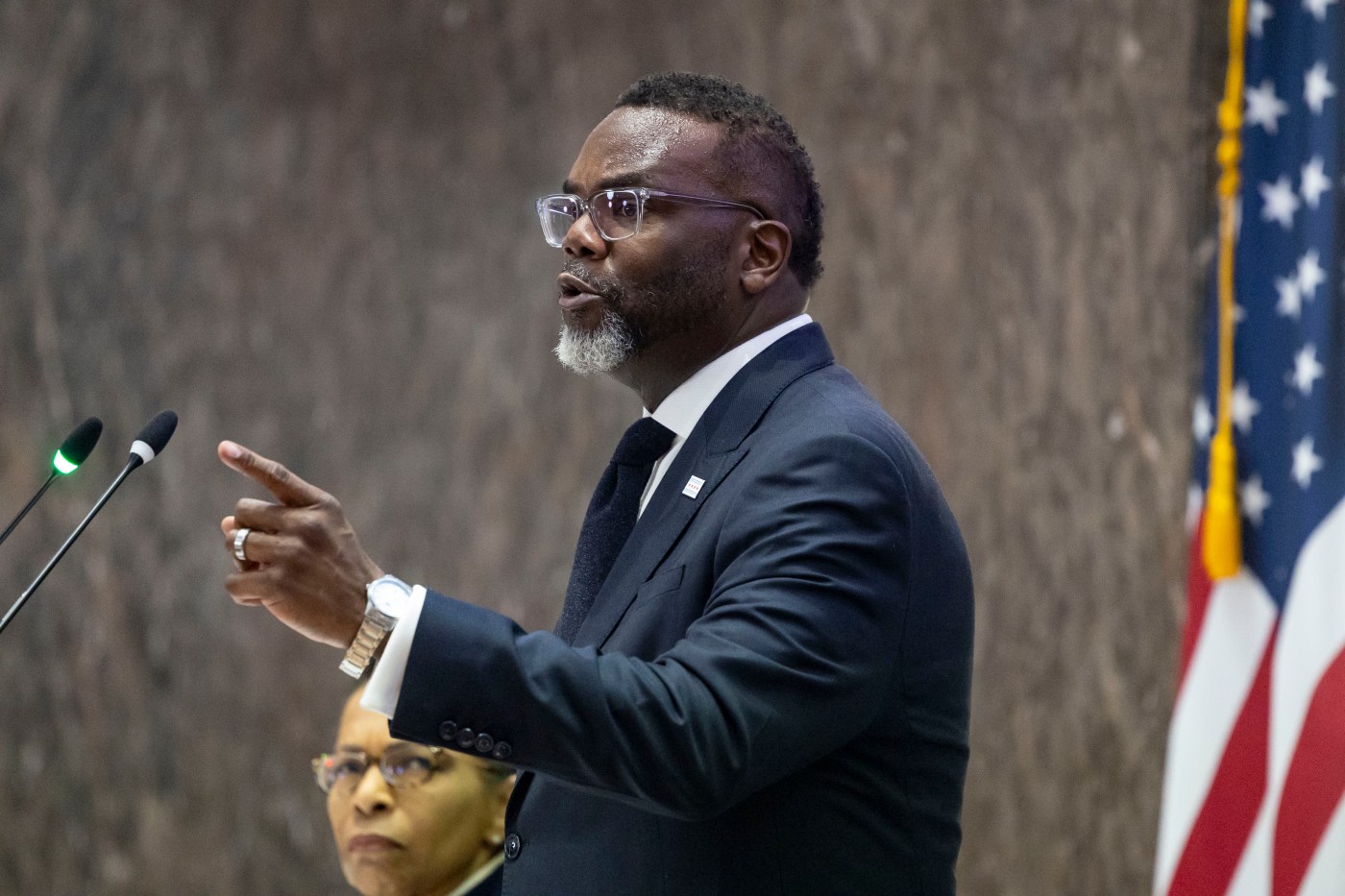As aldermen began to wrap their heads around Mayor Brandon Johnson’s budget proposal Tuesday, what lies ahead at City Hall came into focus: another long, uphill battle.
City Council members got their first chance to ask questions and set hard lines as Johnson’s top finance leaders sat before them during the first of a planned month’s worth of budget hearings on the mayor’s $16.6 billion plan. And if Tuesday’s first look shows what’s in store for the negotiations ahead, Johnson’s knotted path to winning a City Council majority could once again draw out the process.
That challenge only grew more complicated away from council chambers when Gov. JB Pritzker came out in opposition to the reinstated $21-per-employee “head tax” on larger businesses that Johnson has proposed to raise an estimated $100 million to help balance the budget.
Pritzker told the Economic Club of Chicago Tuesday he is “absolutely, four-square opposed” to the tax, drawing emphatic applause from the assembled business leaders.
“It penalizes the very thing that we want, which is we want more employment in the city of Chicago, and it makes it very hard to attract companies from outside of Chicago to come into Chicago and harder for companies that are in Chicago to stay,” he said.
Pritzker said Johnson and the City Council should focus instead on fostering economic growth and finding “efficiencies,” a byword for budget cuts.
“I haven’t seen any of that in this budget so far,” Pritzker said. “I think that’s going to have to happen because there are going to be changes people are not going to like, certain kinds of revenue enhancements that he’s got in his budget.”
Back at City Hall, Ald. Anthony Beale, one of Johnson’s most antagonistic opponents, was the first of around 40 aldermen in attendance to take his 10-minute turn probing the mayor’s team. Like other mayoral adversaries, the far South Side alderman used his time as an opportunity to slam Johnson’s proposal.
Beale’s opening salvo was a reminder that the mayor has an all-but-zero chance of winning over some aldermen, narrowing his path to getting 26 votes.
“This is all smoke and mirrors, and I think when the smoke clears, everyone will see that this is a horrible budget, and that it needs to change,” Beale said.
But while Johnson’s predictable foes quickly stated their outright objection, many of the middle-of-the-council aldermen who he will need to persuade also made clear their initial skepticism of his plan.
Chief among their complaints was the mayor’s bid to sweep a record-smashing $1 billion surplus from the city’s tax increment financing districts. The move would take away money set aside for dozens of projects being planned in neighborhoods across the city, the critics argued.
Budget Director Annette Guzman told aldermen the so-called “TIF sweep” followed a pre-set method as aldermen complained that the purses they largely control could be emptied.
“I hear that there’s money, but it takes so long in the city of Chicago to bring a project to the table,” said Ald. Michelle Harris, Johnson’s handpicked Rules Committee chair. “If we sweep the TIF in communities like mine, then my future projects are dead.”
Ald. Nicole Lee said later she was “shocked at the number” when she saw it. Projects she has been working toward for years, like a Donovan Park fieldhouse, would have no money to move forward, she said.
“To not have had the conversation with us at the ward level, the aldermanic level, it was pretty off-putting,” she said. “We all have plans.”
Even Ald. Jason Ervin, picked by Johnson to lead the Budget Committee, interjected to say 70% of the swept money would come from disadvantaged areas. Ervin also drew a clear line in the sand:
“This budget will not leave this committee without a signed intergovernmental agreement from Chicago Public Schools,” he said, a reference to CPS’s promise to reimburse the city for over $100 million.
Other aldermen questioned the overall fiscal responsibility of Johnson’s budget.
Ald. Brendan Reilly questioned whether the budget was truly made of lasting “structural” changes, as Johnson’s team has said it is, given the massive one-time TIF sweep.
“This is a roadmap to structural balance for the city,” Guzman told him. “The city didn’t get here overnight—in fact, it’s been decades in the making and the city won’t get out overnight.”
Reilly also cast doubt on the legal feasibility of Johnson’s plans to add a first-of-its-kind tax on social media tech giants.
Ald. Pat Dowell, Johnson’s Finance Committee chair, questioned Guzman on a new fund the mayor wants to use to pay for anti-violence programs like youth summer jobs with permanent city money as federal grants expire.
“I’m of the thought, budget director, that when you max out your credit card and your bill is high, you shouldn’t be adding new stuff to the house,” Dowell said.
Other aldermen sounded the alarm against proposed layoffs in the city workforce.
“We cannot balance this budget on the backs of working people, and particularly those working people who are employed by the city of Chicago,” said Ald. Michael Rodriguez, chair of the Workforce Development Committee. “I could not support a budget that’s balanced on the backs of our workforce.”
Tuesday’s hearing was the first of several over the next few weeks in which department heads will appear before aldermen, who can grill them about plans for next year.
https://www.chicagotribune.com/2025/10/21/chicago-budget-gov-jb-pritzker-opposes-head-tax/
